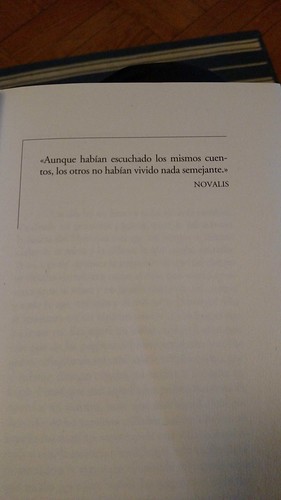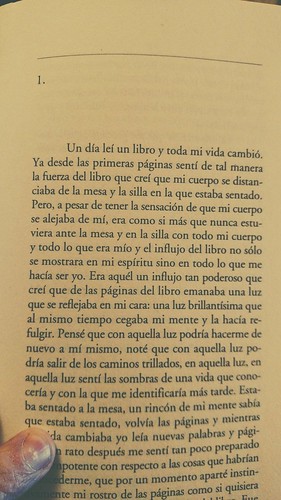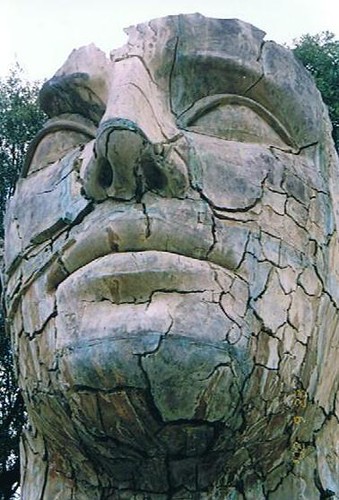|
|
Tuesday, March 19th, 2019
A bilingual edition (the translation is Weinberger's) is online at the website of Editorial Pequeño Dios.
posted afternoon of March 19th, 2019: Respond
➳ More posts about Altazor: The Journey by Parachute
|  |
Sunday, April 29th, 2018
I read To Reign in Hell this weekend and liked it. A few thoughts:
- How come fantasy authors like puns so much? The puns in To Reign in Hell are generally kind of weak and add little or nothing to the story; my memory suggests that this is generally true of the genre. An occasional bit of fun is one thing, but when it's happening every couple of pages, it becomes a distraction.
- The characters are generally great. Seems like it would be pretty difficult to sketch a divinity, and Brust's angels do come across as pretty human. Yahweh is a weak link, and I think it's because the attempt is to portray him explicitly as divine. Abdiel is very strong, and I don't see any similar attempt being made in his case; make of it what you will.
- I need to read Milton -- my understanding of the story was pretty facile based on lack of familiarity with the source text.
posted evening of April 29th, 2018: Respond
➳ More posts about Paradise Lost
|  |
Sunday, April 22nd, 2018
It is nice sometimes to happen on a book you're completely unfamiliar with, pick it up and see where it takes you. In the book box at Mountain Station this Friday, I found a copy of Orhan's Inheritance (2015), the first novel of Aline Ohanesian. Intrigued by the Turkish setting and wondering idly if the titular character's name was some kind of Pamuk reference :), I took it home. Started reading last night and sort of drifted off after ten pages. Started reading this morning and did not put the book down until I had finished it and read the author's note! Really engaging and well-told story.
posted evening of April 22nd, 2018: Respond
|  |
Saturday, April 21st, 2018
I wonder if a pastiche of Milton has been written, in which rebellious angel Jehovah leads a divine junta to depose constitutional ruler of heaven Lucifer and assume the title of dictator/God? (Posed the question on Facebook and my friend Sharon was able to direct me to Steven Brust's To Reign in Hell, which while not exactly that, looks fascinating...)
posted evening of April 21st, 2018: Respond
|  |
Sunday, April 8th, 2018
Two difficult points in reading The New Life -- I am trying to identify with a narrator who is (a) running away to join a cult, or something with distinct parallels to a cult, and is (b) harrassing Janan, who has repeatedly told him to keep his hands off her.
posted afternoon of April 8th, 2018: Respond
➳ More posts about The New Life
|  |
|
I am now starting chapter 9 in my reread of The New Life-- if memory (aided by blog) serves, this is as far as I ever got the first time I read it. In the past month or two I've read the first eight chapters in Spanish and then in English. Going forward, I'll be reading each chapter in one language and then the other. (Not really trying to compare the two translations here, I'm just looking to (a) improve my Spanish and (b) get a deeper understanding of the text.)
It is tempting to try to imagine myself in the shoes of the narrator -- as I am reading the book, I'm trying to identify the book I'm reading with the unnamed book that the narrator is reading, so that it will take me to a new level of perception (as it does I, the narrator). But I-the-reader am having some trouble figuring out what's the allure of reading such a book, joining such a peculiar society as those-who-have-read-and-understood "the book", it seems more an onerous burden than a blessing. But as I say I'm only less than halfway through currently. Keep waiting for Pamuk to tip his hat! :) Osman and Janan are meeting Dr. Fine/Delicado, author (IIUC) of the book (not super crazy about either translation, I guess the man's name is a Turkish word with that meaning and it's going to be important somehow to understanding the text, to get that pun) -- maybe they're (we're) going to get access to the supernatural reality of the book (the book).
posted morning of April 8th, 2018: 3 responses
➳ More posts about Orhan Pamuk
|  |
Saturday, March 24th, 2018
I've been reading Pamuk's The New Life, four chapters in now; here are a couple of headings.
- Wonder about class. Osman is an engineering student; does this mark his family (in 1990s Turkey) as wealthy? or at least as whatever the 1990s Turkey equivalent of upper-middle-class is? I'm wondering how he has the wherewithal to disappear for weeks of riding busses around Turkey, presumably eating and staying in hotels... In Chapter 4 he takes some money from his dead seatmate after the bus crashes, but this is after a long period in which money has not been mentioned. (Possibly this is the wrong approach, or not a useful approach, to an allegorical story.)
- The fascination with crashes and death is noteworthy. Wondering if it would be worth going back to Weisel's The Accident (which I read as a young man and have practically no memory of). This is a point of identification for me, my "new life" began after surviving an accident as a 13-year-old.
- The fascination with death is a point of comparison to Dante. Janan is comparable in some ways to Beatrice but her role is much different.
posted morning of March 24th, 2018: Respond
|  |
Saturday, March 17th, 2018
Once upon a time, not so very long ago and yet not so recently, everything imitated everything else, and thus, if not for aging and death, man would've never been the wiser about the passage of time.
It seems to me like this blog came into its own when I started reading Snow in 2007. While I was reading My Name is Red (directly afterwards), I did a Google search for the lovely quote above concerning aging and death, and happened on Rafael Carpintero's overview of his translation workshop, "Un autor en busca de tres traductores". Alas the article was in Spanish, a language I did not know, at the time, sufficiently to follow the full article.Well in the intervening ten years I've learned Spanish and have had occasional success as a translator... I'm currently starting to read The New Life in Carpintero's Spanish translation, and was led back to "Un autor en busca de tres traductores" -- long story short, I've gotten in touch with Carpintero and have obtained his permission to translate the article!
posted morning of March 17th, 2018: 1 response
➳ More posts about My Name is Red
|  |
Thursday, March 15th, 2018

Pamuk takes his epigraph to The New Life from the first chapter of Novalis's Heinrich von Ofterdingen -- the passage in full,
Wo eigentlich nur der Fremde herkam? Keiner von uns hat je einen ähnlichen Menschen gesehn; doch weiß ich nicht, warum nur ich von seinen Reden so ergriffen worden bin; die andern haben ja das nämliche gehört, und keinem ist so etwas begegnet.
posted evening of March 15th, 2018: Respond
➳ More posts about Novalis
|  |
|
Wow-- if my reactions to the initial few paragraphs of this book are any indication, I'm going to find rereading Pamuk in Spanish revelatory.

 The translation is by Rafael Carpintero, who I reckon is the main translator of Pamuk into Spanish -- I previously ran across his essay on Pamuk as "Un autor en busca de tres traductores", though that was before I could read Spanish, while I was reading My Name is Red. The essay is on page 83-85 of Vasos Comunicantes #36.
posted evening of March 15th, 2018: Respond
| Previous posts about Readings
Archives  | |
|
Drop me a line! or, sign my Guestbook.
•
Check out Ellen's writing at Patch.com.
| |

